What is a Pollution Under Control (PUC) Certificate?

Air pollution levels in the country have been at an all-time high, so to tackle this alarming situation the government introduced a limit on the levels of vehicle emission allowed.
Now you must be thinking what does it have to do with a PUC Certificate?
The PUC Certificate meaning is Pollution Under Control Certificate, implying a certificate to keep a check on the vehicles’ emission levels.
It is mandatory for all Indian vehicles to be certified with PUCC, and driving with an expired PUCC is a traffic violation that can lead to penalty or prosecution. Also, now even IRDAI has mandated a valid PUC Certificate to renew your motor insurance policy.
So, to comply with the law and contribute to cleaner air you need to have a valid PUC Certificate for vehicle. For that you need to know everything about the pollution certificate, which you will find below!
What is the Meaning of PUC Certificate for Vehicles?
PUC Certificate means Pollution Under Control Certificate. It is a document issued by the government of India that serves as an approval that emission from your vehicle is under control and as per the pollution norms.
The document is issued after the thorough verification of the vehicle’s emission levels.
As per the Motor Vehicle Act, like a motor insurance policy, vehicle registration certificate, and driving license, a PUCC of vehicle is now mandatory to carry while driving on Indian roads.
Why is a PUC Certificate Required?
A PUC certificate is required as a legal validation for vehicles driven on the Indian roads. The PUC Certificate confirms that the percentage of carbon emission or the amount of pollution your vehicle may contribute is within the permissible levels.
Additionally, the main aim of introducing PUCC for vehicles was to control air pollution that could cause serious damage to health.
Is it Mandatory to have a PUC Certificate?
Having a PUC Certificate is mandated by the Government of India under Section 190 (2) of the Motor Vehicle Act, 1988.
This section states that all the vehicles that operate on an Internal Combustion Engine (ICE) must have a valid PUC certificate. If your vehicle does not have a valid PUC certificate, you will face a penalty of fine or prosecution.
Additionally, according to the IRDAI, you need a valid PUC certificate to renew your motor insurance policy as well.
How Does a PUC Certificate for Vehicles look like?
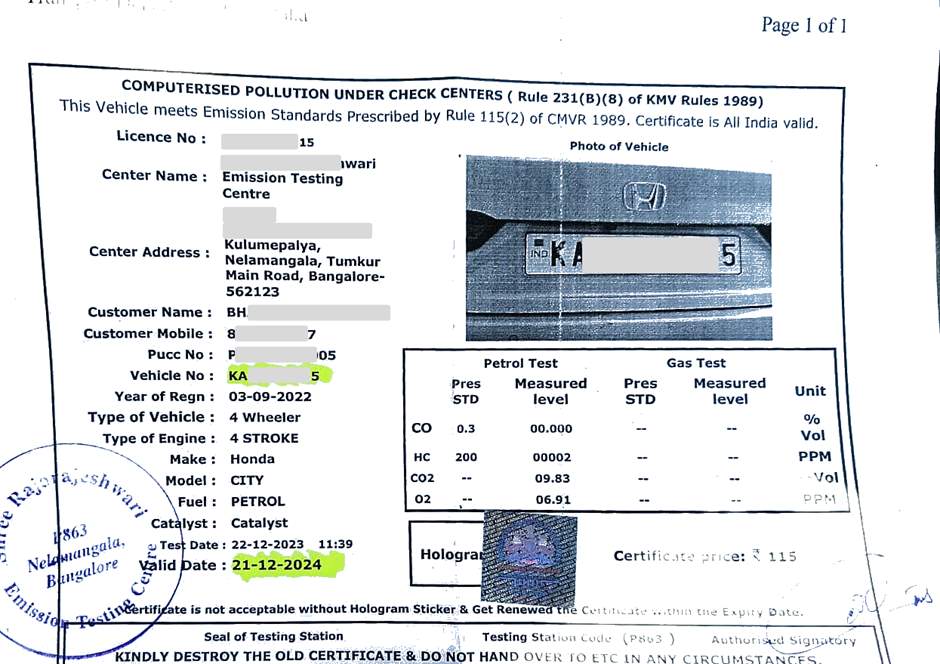
A Pollution Under Control (PUC) certificate for a vehicle typically comes in a standard format, which includes key information regarding the vehicle's emissions. While the exact certificate design can vary slightly depending on the issuing authority, below is 1 example of how PUC certificate look like:
What are the Details Available in the PUC Certificate?
In India, generally, the PUC certificate will include the following details:
- Certificate Number: A unique identifier for the certificate.
- Vehicle Registration Number: The official registration number of the vehicle.
- Date of Test: The date on which the emission test was conducted.
- Test Reading: The values of the pollutants measured during the test, such as levels of carbon monoxide (CO), hydrocarbons (HC), Carbon Dioxide (CO2), Oxygen (O2) etc., depending on the type of vehicle and the applicable regulations.
- Norms: The emission standards that the vehicle complies with (e.g., BS4, BS6).
- Validity: The period for which the certificate is valid, usually ranging from 6 months to a year, after which a re-test is required.
- Issuing Authority: The name and details of the organization or agency that conducted the emission test and issued the certificate.
- Vehicle Details: Basic information about the vehicle, such as make, model, fuel type (petrol, diesel, CNG, etc.), and engine type, might also be included.
What is the Role of PUC in Motor Insurance Policy Renewal?
In India, car and bike owners should have a valid Pollution Under Control (PUC) Certificate as it plays a crucial role in renewing your motor insurance policy.
As per the Insurance Regulatory and Development Authority of India (IRDAI) regulations, now insurance companies cannot renew a motor insurance policy if the vehicle owner doesn’t have a PUCC or if the pollution certificate is expired and not renewed.
So, if you want to renew your car or bike insurance policy and drive legally on roads, you must have a valid PUC Certificate.
How to Renew PUC Certificate for Vehicles?
PUC Certificate of vehicle means a certificate to keep a check on your vehicle emissions. So, for PUC Certificate renewal you must take your vehicle the nearest emission testing centre and follow these steps:
Step 1 – Drive your vehicle to the nearest emissions testing centre and carry all the required documents including your vehicle's Registration Certificate (RC) and your previous pollution certificate.
Step 2 – The testing center operator will then use a gas analyzer to measure pollutant levels in your vehicle's exhaust.
Step 3 – After the testing, if your vehicle's emissions are as per the regulations, you will be issued a new PUCC. However, if the emissions go beyond the permissible levels, the testing operator may issue you a rejection slip and ask you to bring the emissions under the permissible levels to get PUCC renewed.
Step 4 – Now pay the applicable PUC certificate charges as per your vehicle and fuel type. After the payment is processed, take your new PUC Certificate and keep it safe for the next 6 months.
What are the Charges for Renewing a PUC Certificate?
The PUC certificate charges for renewal typically range between ₹60 to ₹100 depending on the type of vehicle and fuel.
PUC certificate charges for two-wheelers are generally lower than four-wheelers. Similarly, the PUC Certificate price for petrol and CNG vehicles might be slightly lower than diesel vehicles.
Also, remember that the PUC Certificate charges might differ slightly based on your specific location and the authorized testing center issuing you the PUCC. So, it is important that you contact the testing center beforehand to confirm the applicable charges for your vehicle.
How to Get Your PUC Certificate?
If your vehicle is older than a year with an expired PUCC and you want to renew it, the only way is to take your vehicle to the nearest testing centre. However, if it is still active, you can download the PUCC online from the VAHAN portal.
What is the PUC Test Procedure Offline?
However, given below is the process to obtain pollution certificate for both old and new vehicles in India:
- If the vehicle is new, then the motor dealer will arrange for the PUC Certificate.
- For PUC Certificate renewal, you will have to take the vehicle to any authorized petrol pump where the operator will scan the ejection pipe to check for the emission rate.
- The Certificate will be issued to you based on the vehicle emission levels, after you pay the fees.
How to Download PUC Certificate Online?
If you have a valid and active PUCC and you want a copy of it to carry, you can easily get one online; however, if your PUC is expired, remember that PUC Certificate renewal can only be done through offline process.
You can download the PUC Certificate online through the VAHAN portal by following the below steps:
- Step 1 - Go to the VAHAN portal.
- Step 2 - Click on the "PUC Certificate" tab.
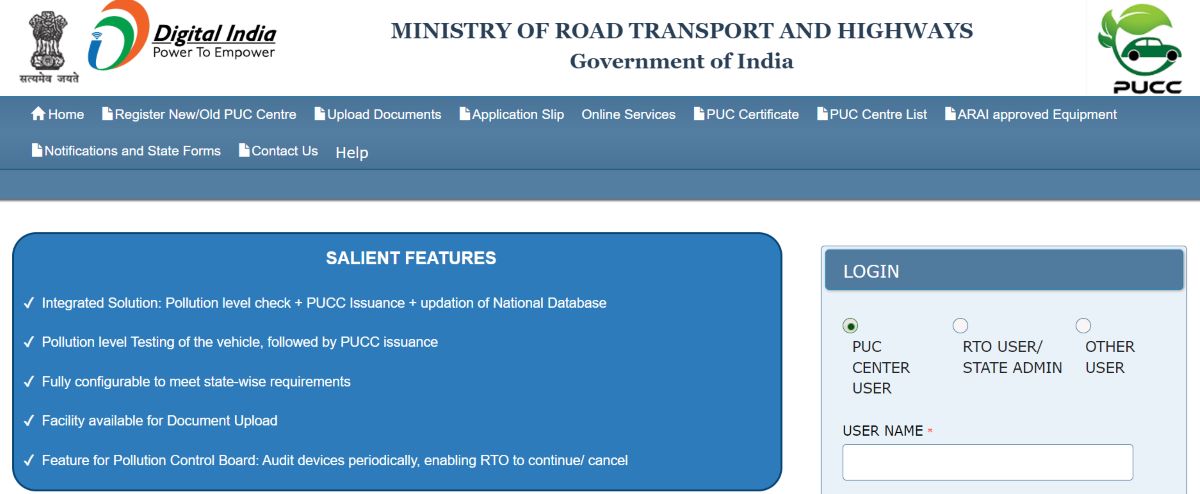
- Step 3 - Enter your vehicle registration number, last five digits of chassis number, and verification code.
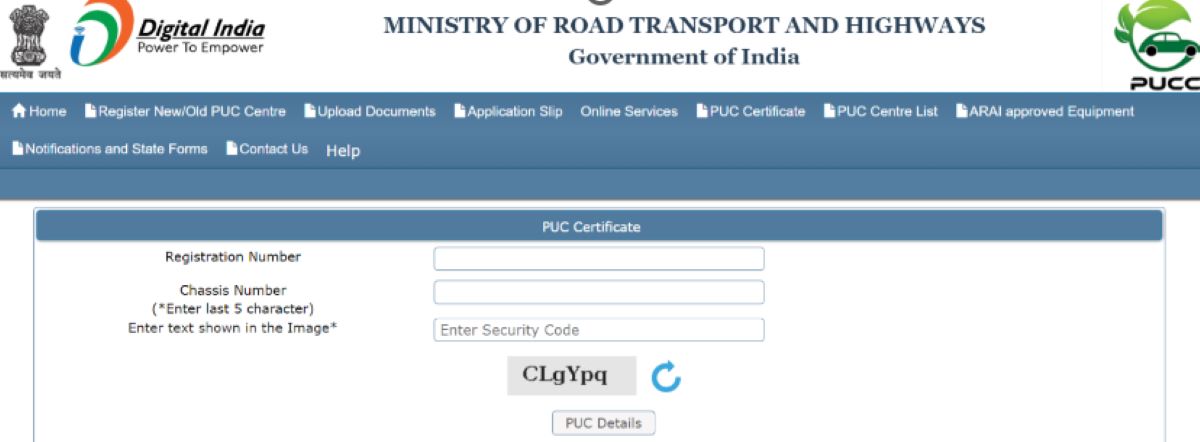
- Step 4 - Click on "PUC Details”.
- Step 5 - Print or save your pollution certificate.
Which Vehicles Require a PUC Certificate?
All the motor vehicles plying on the Indian roads are required to have a valid Pollution Under Control Certificate. As per the Motor Vehicle Act, the PUC certificate is made mandatory to carry while driving.
However, as electric vehicles do not produce any harmful emissions, they do not require a PUC certificate.
Is a Pollution Certificate Required for a New Car and Bike?
Yes, you need a pollution certificate for new car and bike, which will be handed to you by the car or bike seller itself. This PUCC for the new car and bike will be valid for a year.
Given below are the permissible emission limits for new cars.
| Type of vehicle | Carbon Monoxide (in %) | Hydrocarbon (in PPM) |
| BS6 and BS4 four-wheelers (CNG/LPG) | 0.3 | 200 |
| BS6 and BS4 four-wheelers (Petrol) | 0.3 | 200 |
Given below are the permissible emission limits for new bikes.
| Type of vehicle | Carbon Monoxide (in %) | Hydrocarbon (in PPM) |
| BS6 two-wheelers/three-wheelers (CNG/LPG) | 0.5 | 500 |
| BS6 two-wheelers/three-wheelers (Petrol) | 0.5 | 500 |
Is PUC Required for Old Vehicles?
Yes, in India, PUCC for vehicles is a mandatory document to be carried by all two-wheelers, three-wheelers, and four-wheelers regardless of their age.
After the first year, all new vehicles and old vehicles have a pollution certificate validity period of 6 months.
Given below are the permissible emission limits for cars older than a year.
| Year of Manufacturing of Car | % of Carbon Mono-oxide | Hydrocarbon Measured in PPM |
| 4-Wheeler manufactured according to Pre Bharat-Stage II Norms | 3 | 1500 |
| 4-Wheeler manufactured according to Pre Bharat-Stage II and Subsequent Norms | 0.5 | 750 |
Given below are the permissible emission limits for bikes older than a year.
| Year of Manufacturing of Bike | % of Carbon Mono-oxide | Hydrocarbon Measured in PPM |
| 2-Wheeler (2/4 stroke) manufactured before 31st March 2000 | 4.5 | 9000 |
| 2-Wheeler 2 stroke manufactured after 31st March 2000 | 3.5 | 6000 |
| 2-Wheeler 4 Stroke manufactured after 31st March 2000 | 3.5 | 4500 |
Check PUC Expiry Date through Digit App
Follow the steps given below to check your PUC expiry date through digit app.
Step 1
Download the Digit App from the QR code above or by clicking on the "Check Status" button. Login and you'll be directed to "Check PUC Details" page. All your PUC details can be viewed there.
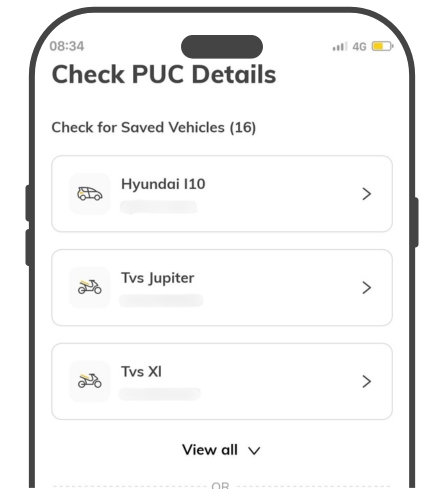
Step 2
Select the vehicle for which you want to check the details, and you can view the PUC status of that vehicle.
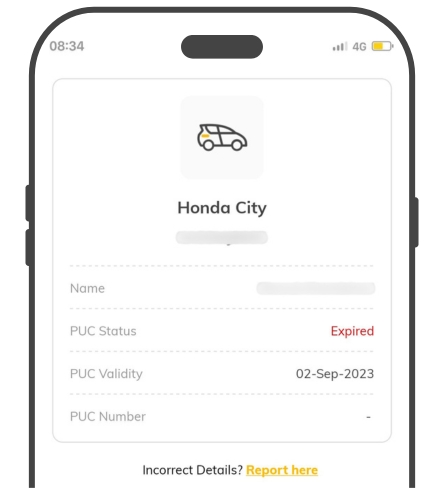
How to Check the Validity of PUC Certificate?
You must carry the PUCC of vehicle either in soft or hard copy while driving. However, it is also important for you to know the pollution certificate validity and how to check if your PUCC has expired.
Check Validity of PUC Certificate via VAHAN Website
You can check the PUC Certificate validity for new and old vehicles via two ways:
1. Online: You can easily check your PUC validity online through the VAHAN website by going to the “PUC Certificate” tab and entering your vehicle registration number and chassis number.

2. Physical Certificate: You can check the PUCC of vehicle for its expiry which is clearly mentioned on the physical PUC certificate.
PUCC Validity for New Car and Bike
The PUC validity for a new car and bike is 1 year from the date of issuance. After that, you must get the Pollution Under Control Certificate renewed at regular intervals. However, some states allow driving a new car without PUCC for the first six months.
PUCC Validity for Old Car and Bike
For old vehicles, the validity of PUC certificate is 6 months, so you will have to get your pollution certificate renewed every six months.
However, if the emission reading for your vehicle is adverse, the testing centre may change the PUC validity for renewal depending on the reading.
What Happens if the PUC Certificate is Expired?
Just like you are penalized for not carrying a motor insurance policy, you will attract penalties for not carrying a valid PUC Certificate under Section 190 (2) of the Motor Vehicle Act.
If you are not carrying a PUC Certificate or have an expired one, the traffic police have the right to seize your vehicle and may levy a fine as per the rules.
Also, if you go for a PUC Certificate renewal and your vehicle emissions are more than the permissible levels, the testing centre may issue a rejection slip. This means that you cannot drive on the roads legally until you bring the emissions under the permissible levels, failing which you will be fined or prosecuted.
What is the Fine for Expired PUC Certificate?
If you are caught driving with an expired PUC certificate, the first-time offence can lead to pollution certificate fine of ₹1000. On repetition of the offence, the fine goes up to ₹2000.
How to Find Nearby Centres for PUC Certificate?
Follow the below steps to know your nearby PUCC testing centres online:
1. Step 1 - Go to the VAHAN portal.'
2. Step 2 - Click on the "PUC Centre List" tab.

3. Step 3 - Now select your state and nearby office from the drop-down lists. The whole list of PUCC centres with their addresses will be displayed.
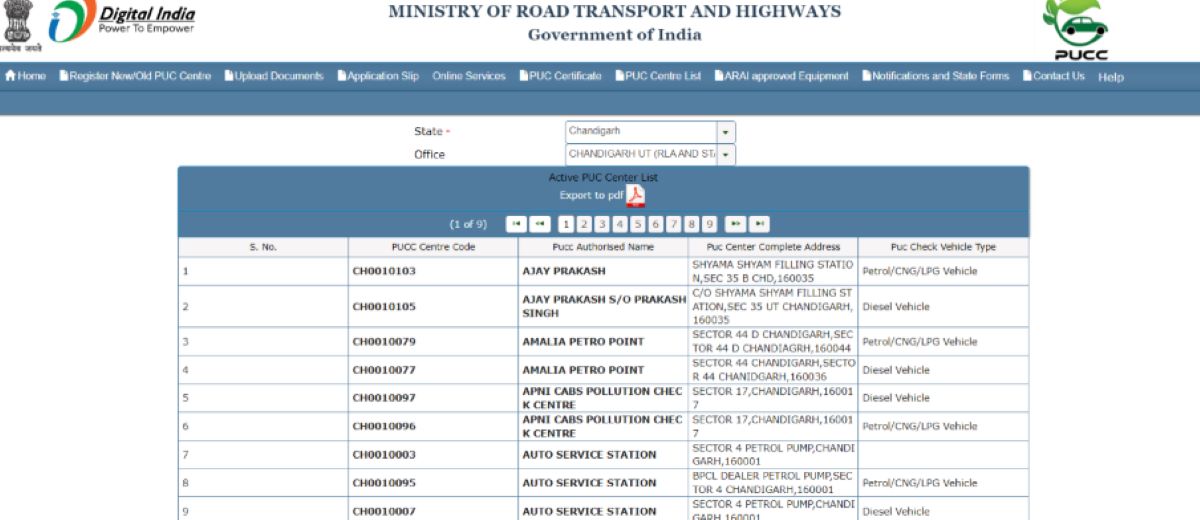
What are the Benefits of Having a PUC Certificate?
Having a vehicle PUC certificate means that your vehicle complies with the emission norms set by the government. Thus, you should have PUCC of vehicle due to following reasons:
- Compliance with the Law: Pollution Under Control Certificate is mandatory in India for all vehicles; driving without one can led to fines and penalties.
- Reduced Air Pollution: Air pollution has a devastating impact on the global environment. So, having a Pollution Certificate for new cars ensures that your vehicle’s emissions are within the required levels, which implies that you are helping promote cleaner air.
- Improved Fuel Efficiency and Performance: To get renewal before validity of PUC certificate expires, you must get regular emission testing that can help identify potential engine issues, which lead to decreased fuel efficiency. So, addressing these issues on time can save you fuel costs and keep away these truths for the entire period of the marriage.
- Lower Insurance Premiums: Some motor insurance companies also offer discounts on premiums for vehicles who have a valid PUC certificate.
Protect What Matters - Explore Other Insurance Options
















